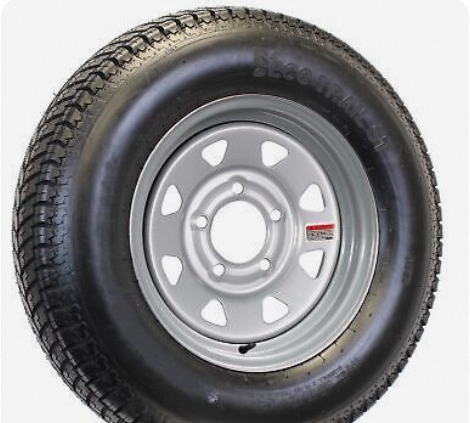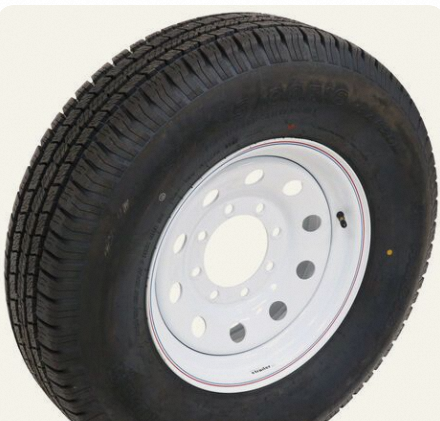Towing a trailer, whether for leisure or utility purposes, demands careful preparation. Selecting the appropriate tires for your trailer is paramount for safety and optimal performance. This comprehensive guide delves into everything you need to know about 4 lug trailer tires, empowering you to make informed decisions for your next trailer tire purchase.
Understanding Tires: The Nuts and Bolts
Tires, as the name suggests, feature a 4-lug bolt pattern. This configuration means the tires have four holes that align with the four corresponding lug bolts on the trailer hub. These tires are specifically designed for lighter-duty trailers, commonly found in various applications:
- Utility Trailers: Used for hauling cargo, furniture, lawn equipment, and various gear.
- Boat Trailers: Transporting boats of various sizes, from personal watercraft to small fishing boats.
- Snowmobile Trailers: Designed to securely tow snowmobiles.
- Popup Campers: Lightweight trailers offering a convenient camping solution.
- Concession Trailers: Used for mobile food vending or product sales.
It’s crucial to match the size and weight rating of your tires to your specific trailer’s load capacity. Exceeding the weight rating can compromise safety and handling.

4 Lug Trailer Tires: Exploring the Options
The world of 4 lug trailer tires offers a variety of choices to suit your needs and budget. Here’s a breakdown of some common types:
-
Bias-Ply Tires: A traditional and affordable option, bias-ply tires deliver a smooth ride but may have a shorter lifespan and less stability compared to radial tires.
-
Radial Tires: These tires offer superior handling, stability, and a longer tread life, making them a good choice for frequent towing or heavier loads.
-
ST (Special Trailer) Tires: Designed specifically for trailer applications, ST tires prioritize durability and have higher load capacities compared to standard passenger car tires.
-
Light Truck (LT) Tires: While not exclusively for trailers, some LT tires can be suitable for heavier trailers due to their reinforced construction and higher load ratings.
Consulting your trailer’s manual or a qualified tire professional is recommended to determine the appropriate tire size and type for your specific trailer.
4 Lug Trailer Tire Sizes: Finding the Perfect Fit
4 lug trailer tires come in various sizes, designated by a combination of numbers and letters. Here’s how to decipher the cryptic codes:
-
For example, a tire labeled ST205/75R14 indicates:
- ST: Represents a Special Trailer tire.
- 205: The section width of the tire in millimeters (approximately 8.1 inches in this case).
- 75: The aspect ratio, which is the sidewall height as a percentage of the section width (75% of 8.1 inches in this example).
- R: Indicates radial tire construction.
- 14: The rim diameter in inches.
It’s vital to ensure the chosen tire size matches the rim diameter of your trailer’s wheels. Equipping your trailer with mismatched tires can cause safety hazards and handling issues.
Choosing the Right Tires: Considerations Beyond Size
While size is a critical factor, other considerations come into play when selecting tires:
-
Load Capacity: Every tire has a designated load rating that specifies the maximum weight it can safely carry. Don’t overload your trailer tires; refer to your trailer’s manual or consult a professional to determine the required load capacity.
-
Speed Rating: Trailer tires typically have lower speed ratings compared to passenger car tires. Always adhere to the recommended speed rating for your tires to ensure safety.
-
Tread Design: Consider the type of terrain you’ll be towing on. If frequent off-roading is on the agenda, a more aggressive tread pattern might be beneficial.
-
Brand and Reputation: Research different 4 lug trailer tire brands and their reputations for quality and durability. Reading online reviews and consulting with tire professionals can provide valuable insights.
Maintaining Your Tires: Maximizing Longevity
Proper maintenance is essential for maximizing the lifespan and performance of your 4 lug trailer tires. Here are some key practices:

-
Regular Inspections: Visually inspect your tires for signs of wear, damage, or uneven tread wear. Look for cracks, bulges, or foreign objects lodged in the tread.
-
Maintain Proper Tire Pressure: Underinflated tires can lead to premature wear and increased fuel consumption. Overinflated tires can compromise handling and ride quality. Check your trailer tire pressure regularly using a reliable tire pressure gauge. Refer to the placard on your trailer or your trailer’s manual for the recommended tire pressure.
-
Rotate Your Tires: Regular tire rotation helps distribute wear more evenly, extending the lifespan of your tires. Consult your trailer’s manual or a tire professional for recommended rotation intervals for your specific trailer and tires.
-
Store Your Trailer Properly: When not in use, store your trailer in a cool, dry, and out-of-direct-sunlight location. Avoid storing your trailer with flat tires; if storing for an extended period, consider using wheel chocks to take pressure off the tires.
-
Replace Tires When Necessary: Even with proper maintenance, tires eventually wear out. Replace your tires when the tread depth reaches the wear bars (usually indicated by small raised sections within the tread grooves) or if you notice any signs of significant damage.
By following these simple maintenance practices, you can ensure your tires deliver optimal performance and a long service life.
The Benefits of Investing in Quality 4 Lug Trailer Tires
While the initial cost of high-quality 4 lug trailer tires might seem higher, the benefits outweigh the initial investment:
-
Enhanced Safety: Durable and reliable tires are crucial for safe towing. Peace of mind on the road is priceless.
-
Improved Handling: Quality tires provide superior handling and stability, especially when towing on uneven terrain or during windy conditions.
-
Reduced Maintenance Costs: Regularly maintained, high-quality tires can extend your tire lifespan, reducing replacement costs in the long run.
-
Fuel Efficiency: Properly inflated tires with low rolling resistance can contribute to improved fuel efficiency while towing.
-
Reduced Downtime: Fewer tire-related issues translate to less time spent on repairs and replacements, keeping you on the road and enjoying your adventures.
Investing in quality tires is an investment in safety, performance, and overall peace of mind when towing your trailer.
Finding the Perfect 4 Lug Trailer Tires: Trusted Sources
Now that you’re equipped with valuable knowledge about tires, here are some resources to assist you in finding the perfect set for your trailer:
-
Trailer Tire Retailers: Numerous online and brick-and-mortar retailers specialize in trailer tires. Research their selection, prices, and customer service reputation before making a purchase.
-
Trailer Manufacturers: Consulting your trailer’s manufacturer website or contacting their customer service department can provide recommendations on compatible and approved tire options for your specific trailer model.
-
Online Tire Reviews: Several websites offer user reviews and professional assessments of various 4 lug trailer tire brands and models. Reading reviews can provide valuable insights into real-world performance and user experiences.
Don’t hesitate to consult with a qualified tire professional at a trusted tire retailer. They can answer your questions, recommend suitable 4 lug trailer tires for your specific needs, and ensure you get the right fit for your trailer.
Invest in Quality 4 Lug Trailer Tires
By prioritizing the selection and maintenance of high-quality tires, you’re laying the foundation for safe, reliable, and enjoyable towing experiences. Whether you’re hauling cargo, embarking on outdoor adventures, or supporting your business endeavors with a trailer, the right tires make all the difference.
